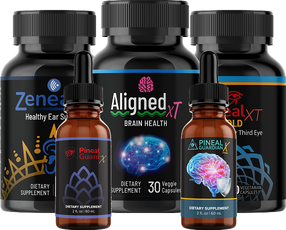How Effective Is Bacopa Monnieri for Memory? What Research Shows

Memory isn't just about remembering where you left your phone.
It's about preserving your independence, maintaining your identity, and staying connected to the people and experiences that matter most.
If you've noticed yourself struggling to recall names, losing focus during conversations, or feeling mentally foggy more often than you'd like, you're not alone. Cognitive decline affects millions of people, but emerging research suggests certain botanical compounds may offer genuine support.
Bacopa monnieri, a small aquatic herb used in Ayurvedic medicine for over 3,000 years, has become one of the most researched natural compounds for cognitive enhancement.
Let's examine what clinical science actually tells us about this ancient remedy and whether it lives up to its reputation.
Understanding Memory and Cognitive Decline
Before exploring Bacopa's effects, it's important to understand what happens to our brains as we age.
Cognitive function naturally evolves throughout our lifespan. Key factors contributing to age-related changes include:
- Oxidative stress that damages brain cells and neural connections
- Inflammation in brain tissue that impairs communication between neurons
- Reduced neurotransmitter production, particularly acetylcholine, which is crucial for memory formation
- Decreased blood flow to the brain, reducing oxygen and nutrient delivery
These changes don't happen overnight. They accumulate gradually over years, which is why supporting brain health proactively matters so much.
What Is Bacopa Monnieri?

Bacopa monnieri, also known as Brahmi or water hyssop, is a creeping herb that grows in wetlands throughout India, Asia, and parts of the United States.
In Sanskrit, it's called "Brahmi" after Brahma, the Hindu god of creation, reflecting its traditional use for enhancing memory and intellect.
The herb contains several bioactive compounds called bacosides, particularly bacoside A and bacoside B, which are believed to be responsible for its cognitive effects.
Traditional practitioners prescribed Bacopa to:
- Enhance learning and memory
- Improve concentration and mental clarity
- Support longevity and overall vitality
- Reduce anxiety and mental fatigue
Modern science has now subjected these traditional claims to rigorous clinical testing.
The Clinical Evidence: What Human Studies Show
Unlike many supplements with limited research, Bacopa monnieri has been studied extensively in human clinical trials. Let's examine the most significant findings.
Memory Recall Improvements in Adults

A 2001 double-blind, placebo-controlled study published in Neuropsychopharmacology examined 76 healthy adults aged 40-65 years over 12 weeks [1].
Protocol: Participants received either 300mg of standardized Bacopa extract daily or placebo.
Results:
- Significant improvement in verbal learning and memory recall in the Bacopa group compared to placebo
- Effects became evident after 5-6 weeks and strengthened with continued use
- Participants showed faster information processing speed
- No serious adverse effects reported
This study established that Bacopa's effects on memory are real and measurable in healthy middle-aged adults, the population most concerned about maintaining cognitive function.
Consistent Cognitive Benefits Across Multiple Studies
A 2014 systematic review published in Evidence-Based Complementary and Alternative Medicine analyzed nine randomized controlled trials involving 518 participants [2].
Key Findings:
- Bacopa significantly improved cognition, particularly free recall memory
- Effects were consistent across different study designs and populations
- Benefits appeared after 8-12 weeks of continuous supplementation
- The herb showed a favorable safety profile with minimal side effects
The researchers concluded that Bacopa extract "has potential for safely enhancing cognitive performance in the aging population."
Speed of Information Processing Study
Research published in the Journal of Alternative and Complementary Medicine examined 54 healthy participants who took either 300mg of Bacopa or placebo for 12 weeks [3].
Results:
- Bacopa group showed significant improvements in working memory
- Enhanced visual information processing speed
- Reduced anxiety levels compared to baseline
- Effects were dose-dependent and time-dependent
This study highlighted that Bacopa doesn't just help with memory recall—it also speeds up how quickly your brain can process and respond to information.
Elderly Population Study
A 2008 Australian study specifically examined Bacopa's effects in older adults, publishing results in Phytotherapy Research [4].
Protocol: 98 participants aged 55 and older received either Bacopa extract or placebo for 12 weeks.
Findings:
- Significant improvement in memory acquisition and retention
- Enhanced attention and cognitive processing
- Reduced rate of forgetting new information
- Benefits persisted for several weeks after discontinuation
This research is particularly important because it demonstrates effectiveness in the population most vulnerable to age-related cognitive decline.
How Bacopa Works: The Science Behind the Benefits

Based on extensive preclinical and clinical research, Bacopa appears to support cognitive function through several interconnected mechanisms:
1. Enhancing Neurotransmitter Function
Bacopa has been shown to modulate key neurotransmitters involved in memory and learning [5]:
- Acetylcholine: Bacopa inhibits acetylcholinesterase, the enzyme that breaks down acetylcholine. This leads to increased acetylcholine availability in the brain, supporting memory formation and recall.
- Serotonin and GABA: The herb influences these neurotransmitters, which may explain its anxiety-reducing effects observed in several studies.
Think of neurotransmitters as messengers that carry information between brain cells. Bacopa helps ensure these messages are transmitted efficiently and effectively.
2. Powerful Antioxidant Protection
Research demonstrates that Bacopa provides robust antioxidant activity in brain tissue [6]:
- Reduces lipid peroxidation (oxidative damage to cell membranes)
- Increases superoxide dismutase and other endogenous antioxidants
- Protects neurons from oxidative stress-induced damage
- Preserves mitochondrial function in brain cells
Oxidative stress accelerates brain aging. Bacopa acts like a protective shield, neutralizing free radicals before they can damage delicate neural tissue.
3. Supporting Neuroplasticity and Synaptic Function
Studies have shown that Bacopa can promote:
- Dendritic branching (growth of neural connections)
- Synaptic communication between neurons
- Protein synthesis needed for memory consolidation
- Neuronal repair and maintenance
This means Bacopa doesn't just protect existing brain cells—it actively supports the brain's ability to form new connections and adapt, a quality called neuroplasticity that's essential for learning and memory.
4. Improving Cerebral Blood Flow
Research indicates Bacopa may enhance blood circulation to the brain [7], which:
- Delivers more oxygen and nutrients to brain tissue
- Removes metabolic waste products more efficiently
- Supports overall brain energy metabolism
- May contribute to improved cognitive processing speed
Dosage, Timeline, and Quality Considerations
Understanding proper usage is crucial for achieving the benefits demonstrated in clinical research.
Effective Dosages from Research
Clinical studies showing cognitive benefits typically used:
- 300-450mg daily of standardized Bacopa extract
- Standardized to 40-55% bacosides (the active compounds)
- Divided into 1-2 doses throughout the day
- Taken with food to enhance absorption
Timeline for Results
One of the most important findings across Bacopa research: patience is essential.
Unlike stimulants that provide immediate but temporary effects, Bacopa works gradually to produce lasting cognitive improvements. This reflects its mechanism of action, supporting fundamental brain health rather than providing a quick fix.
Quality Factors That Matter
Not all Bacopa supplements are created equal. Research-backed formulations should include:
Standardization: Look for extracts standardized to bacosides content (40-55%). This ensures consistent active compound levels.
Extraction method: Proper extraction techniques preserve the full spectrum of beneficial compounds.
Third-party testing: Verification for purity, heavy metals, and contaminants.
Bioavailability enhancement: Some advanced formulations combine Bacopa with complementary ingredients or delivery systems for improved absorption.
For example, Pineal Guardian X includes Bacopa Monnieri alongside synergistic compounds like Lion's Mane mushroom, Ginkgo Biloba, and Pine Bark Extract in a liquid formula designed for optimal absorption and comprehensive cognitive support.

A Comprehensive Approach to Cognitive Wellness
While Bacopa shows impressive results, we at Nutraville also recommended to cultivate a holistic brain health strategy:
Sleep Optimization: Memory consolidation occurs during deep sleep. Aim for 7-9 hours nightly in a dark, cool environment. Poor sleep undermines even the best supplementation.
Brain-Healthy Nutrition:
- Emphasize antioxidant-rich foods (berries, dark leafy greens)
- Include omega-3 fatty acids (fatty fish, walnuts, flaxseed)
- Minimize processed foods and added sugars
- Stay well-hydrated
Regular Physical Activity: Exercise increases blood flow to the brain, stimulates growth factor production, and supports neuroplasticity. Aim for 150 minutes of moderate activity weekly.
Mental Stimulation: Challenge your brain with:
- Learning new skills
- Solving puzzles and games
- Reading diverse materials
- Engaging in creative activities
Stress Management: Chronic stress impairs memory formation and accelerates cognitive decline. Incorporate practices like meditation, deep breathing, or yoga.
Social Connection: Meaningful social interactions support cognitive health and emotional well-being.
Safety Profile and Considerations
Bacopa monnieri has demonstrated a favorable safety record across numerous clinical trials:
Generally well-tolerated with minimal reported adverse effects in most studies.
Mild side effects occasionally reported include:
- Mild digestive discomfort (taking with food typically resolves this)
- Occasional nausea (usually temporary and dose-dependent)
- Fatigue in some individuals (typically resolves with continued use)
Important considerations:
- May interact with thyroid medications (affects thyroid hormone levels)
- Could potentially interact with medications metabolized by cytochrome P450 enzymes
- Limited data on use during pregnancy and lactation
- May have mild sedative properties (though most studies report anxiety reduction rather than excessive drowsiness)
As with any supplement, consultation with a healthcare provider is advisable before beginning supplementation, particularly for individuals with existing health conditions or those taking medications.
The Bottom Line: Does Bacopa Really Work?
Based on extensive clinical evidence spanning decades of research, Bacopa monnieri demonstrates genuine effectiveness for supporting cognitive function, particularly memory recall and learning.
What makes the evidence compelling:
- Multiple high-quality, placebo-controlled human trials
- Consistent results across different populations and study designs
- Clear dose-response and time-response relationships
- Understood mechanisms of action supported by both clinical and preclinical research
- Favorable safety profile with minimal side effects
What to expect realistically:
- Gradual improvements over 8-12 weeks, not overnight results
- Benefits continue to strengthen with consistent, long-term use
- Most pronounced effects on memory recall, learning, and information processing
- Potential anxiety reduction as an additional benefit
Who may benefit most:
- Middle-aged and older adults concerned about maintaining cognitive function
- Individuals experiencing age-related memory challenges
- People seeking natural cognitive support without pharmaceutical side effects
- Those committed to consistent, long-term supplementation
Bacopa monnieri represents one of the most thoroughly researched botanical cognitive enhancers available. The ancient Ayurvedic practitioners who prescribed it for memory and learning were remarkably prescient, modern clinical science has validated these traditional uses with rigorous evidence.
For individuals interested in supporting their cognitive health naturally, Bacopa offers a well-tolerated option with substantial research backing, particularly when used consistently over time as part of a comprehensive approach to brain wellness.
These statements have not been evaluated by the Food and Drug Administration. This product is not intended to diagnose, treat, cure, or prevent any disease.
Frequently Asked Questions
Can I take Bacopa with other brain supplements?
Bacopa is generally well-tolerated when combined with other cognitive support supplements. In fact, some research suggests it may work synergistically with compounds like Ginkgo Biloba, Lion's Mane mushroom, and omega-3 fatty acids. However, if you're taking multiple supplements or medications, consult with a healthcare provider to ensure there are no potential interactions.
Is Bacopa better than prescription memory medications?
Bacopa and prescription cognitive medications serve different purposes and aren't directly comparable. Prescription medications like donepezil are designed for diagnosed conditions such as Alzheimer's disease, while Bacopa is studied primarily for supporting normal cognitive function and age-related memory concerns.
Research shows Bacopa can produce meaningful improvements in memory and learning in healthy adults, with fewer side effects than many pharmaceuticals. However, individuals with diagnosed cognitive impairment should work with their healthcare provider for appropriate treatment.
Will I need to take Bacopa forever to maintain benefits?
Research suggests that Bacopa's cognitive benefits gradually diminish after discontinuation, though some studies show effects persisting for several weeks after stopping. For sustained benefits, ongoing supplementation appears necessary.
Think of it like taking a multivitamin. You benefit while you're consistently using it. That said, the lifestyle and brain health habits you develop while taking Bacopa (better sleep, mental stimulation, healthy diet) will continue benefiting you regardless.
Can younger people take Bacopa for studying or focus?
While most research has focused on middle-aged and older adults, some studies have examined Bacopa in younger populations.
A 2016 study in children found improvements in attention and cognition. However, the strongest evidence supports its use in adults concerned about age-related cognitive changes. Young, healthy individuals seeking focus support might see benefits.
Does Bacopa help with brain fog?
Many users report reduced mental fog and improved clarity when taking Bacopa, though "brain fog" isn't a specific condition studied in clinical trials.
The research showing improvements in information processing speed, working memory, and attention suggests Bacopa may indeed help with the subjective experience of mental cloudiness. Its anti-anxiety effects may also contribute to feeling more mentally clear.
Should I take Bacopa in the morning or evening?
Most studies don't specify optimal timing, though some users prefer taking it in the morning due to its cognitive-enhancing effects. Others find splitting the daily dose (half in morning, half in evening) works well. Some report mild sedative effects and prefer evening dosing.
Experiment to find what works best for you, and take it with food to enhance absorption and minimize digestive discomfort.
What's the difference between Bacopa and Brahmi?
They're the same plant. Bacopa monnieri is commonly called Brahmi in Ayurvedic tradition. However, be aware that in some regions, "Brahmi" may also refer to Centella asiatica (Gotu Kola), which is a different plant entirely.
When purchasing supplements, look for the scientific name "Bacopa monnieri" to ensure you're getting the right herb.
Are there any populations who should avoid Bacopa?
- Individuals who should exercise caution or avoid Bacopa include:
- Those with thyroid disorders (Bacopa may affect thyroid hormone levels)
- Pregnant or nursing women (insufficient safety data)
- People scheduled for surgery (may interact with anesthesia)
- Individuals with slow heart rate or heart rhythm disorders
- Those with gastrointestinal obstructions
Always consult a healthcare provider if you have existing health conditions or take medications.
Can Bacopa reverse dementia or Alzheimer's disease?
Current research does not support the claim that Bacopa can reverse diagnosed dementia or Alzheimer's disease.
However, the herb's neuroprotective properties suggest it may play a role in supporting long-term brain health when used proactively. Anyone with diagnosed cognitive impairment should work with their healthcare provider for appropriate treatment options.
________________________________________________________________________________________________
References
[1] Roodenrys, S., Booth, D., Bulzomi, S., Phipps, A., Micallef, C., & Smoker, J. (2002). Chronic effects of Brahmi (Bacopa monnieri) on human memory. Neuropsychopharmacology, 27(2), 279-281.
PubMed ID: 12093601
Landmark study demonstrating memory recall improvements in healthy adults.
[2] Kongkeaw, C., Dilokthornsakul, P., Thanarangsarit, P., Limpeanchob, N., & Norman Scholfield, C. (2014).Meta-analysis of randomized controlled trials on cognitive effects of Bacopa monnieri extract. Journal of Ethnopharmacology, 151(1), 528-535.
PubMed ID: 24252493
Comprehensive meta-analysis showing consistent cognitive benefits across multiple studies.
[3] Stough, C., Lloyd, J., Clarke, J., Downey, L.A., Hutchison, C.W., Rodgers, T., & Nathan, P.J. (2001). The chronic effects of an extract of Bacopa monniera (Brahmi) on cognitive function in healthy human subjects. Psychopharmacology, 156(4), 481-484.
PubMed ID: 11498727
Research demonstrating improvements in information processing speed and working memory.
[4] Calabrese, C., Gregory, W.L., Leo, M., Kraemer, D., Bone, K., & Oken, B. (2008). Effects of a standardized Bacopa monnieri extract on cognitive performance, anxiety, and depression in the elderly: a randomized, double-blind, placebo-controlled trial. Journal of Alternative and Complementary Medicine, 14(6), 707-713.
PubMed ID: 18611150
Important study showing benefits in older adults, the population most vulnerable to cognitive decline.
[5] Aguiar, S., & Borowski, T. (2013). Neuropharmacological review of the nootropic herb Bacopa monnieri. Rejuvenation Research, 16(4), 313-326.
PubMed ID: 23772955
Comprehensive review of Bacopa's mechanisms of action including neurotransmitter modulation.
[6] Bhattacharya, S.K., Bhattacharya, A., Kumar, A., & Ghosal, S. (2000). Antioxidant activity of Bacopa monniera in rat frontal cortex, striatum and hippocampus. Phytotherapy Research, 14(3), 174-179.
PubMed ID: 10815010
Research demonstrating Bacopa's powerful antioxidant effects in brain tissue.
[7] Kamkaew, N., Norman Scholfield, C., Ingkaninan, K., Taepavarapruk, N., & Chootip, K. (2013). Bacopa monnieri increases cerebral blood flow in rat independent of blood pressure. Phytotherapy Research, 27(1), 135-138.
PubMed ID: 22447676
Study showing Bacopa's effects on cerebral blood flow.




